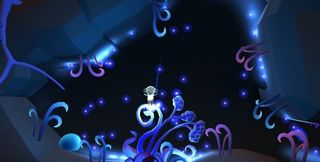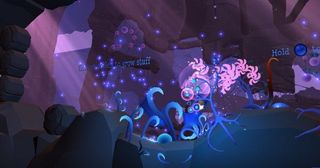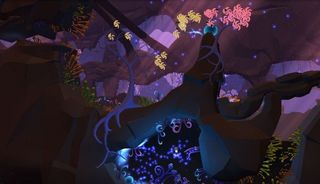Journey into the UnderGarden

Artech's latest game is a distinct change of pace for the studio. Undergarden is a mysterious and gentle puzzle platformer, with a chilled out sountrack and distinctly laid back style. it's a far cry from from the team's first game, Aces of the Galaxy, a frenetic space blaster for XBox Live Arcade. We asked Artech's Audio Director, Mike Keogh a few questions about the thinking behind creating a more slow burn, relaxing experience. Read on for more about UnderGarden's conception, its influences, and the game's co-op mode.
PC Gamer: Why decide to make a peaceful, "Zen" like game, as opposed to something more fast paced?
Mike Keogh: It's hard to pinpoint exactly when the decision was made. We had physics and we were trying to make the game something that literally anyone could pick up and play, and so the feel of the game got really floaty. We're all gamers ourselves, and certainly enjoy first person shooters and fast paced games, but something felt right about this the more we played with the “zen” game style. The artists came up with some really nice stuff to match, and audio followed suit. The foundation happened sort of organically... Maybe on some level it was also a deliberate change of pace after working on the ridiculous speed and constant explosions of Aces of the Galaxy. But it's probably mostly a mixture of initially trying to make something accessible to players who aren't into the intense, hand-eye, action-oriented games, and then also a push from a few people around here who have really enjoyed this emerging genre of “Zen” games and wanting to contribute to that. We found that the more we steered our game in this calm, relaxing direction, the more we had something different that just felt like it hasn't been done in enough games. It's really an experience as much as a series of challenges.

PC Gamer: Can you describe the sorts of puzzles we'll be solving in UnderGarden?
Mike Keogh: The puzzles all revolve around special fruit and rock machines found in the environment. There's a back and forth between collecting pollen, blooming plants to obtain fruit, and figuring out how these big rock contraptions can be weighed down, buoyed up, rotated, turned on and off, exploded and manipulated in other ways to pass through to the next area. There are other environmental obstacles which require special fruit to be collected, strange creatures of sorts and environmental hazards. But these aren't incredibly tough puzzles in general, they're just about playing around with what's available to give variety to the experience. Nothing really hurts the character, at worst you'll get a little shock or be eaten and spit right back out. We tried to figure out which puzzles were taking people a little longer to work through, and made those challenges optional to get collectibles, so there will be some slightly more complicated brain teasers for completionists. The good folks at Atari really wanted to make sure the game is definitely not about frustrating players, and we worked together on the puzzle difficulty issue a lot, and judging from early reactions, that seems to have been a really good way go.
PC Gamer: What would you say are UnderGarden's main influences?
Mike Keogh: Largely the team wanted to make something that was deliberately different from anything out there. We looked a lot at other experiential and "Zen games", like Flower, Flow, Pixel Junk Eden, Lost Winds. We drew inspiration from LittleBigPlanet as such a wonderful and fun platformer with physics and puzzles. People on the team have very different types of games they like to play and different sensibilities about design, though. So all sorts of ideas were put out there during development, and we tried to test out as much as we could. With so much influence from so many different games, we like to think it has this surreal feeling of familiarity, while being a pretty unique experience.
PC Gamer Newsletter
Sign up to get the best content of the week, and great gaming deals, as picked by the editors.

PC Gamer: How will co-op play work in UnderGarden?
Mike Keogh: A second player controls another customizable character with the same abilities as the main character. Because of the physics, this can mean some interesting things when it comes to solving puzzles, because you can try different approaches, bring more, or different, varieties of fruit with you. Or you can just have one player in charge of "the band", collecting musicians, while the other player tries to get you through the world. It's really up to the players to decide. The only restriction is that you can't get too far apart. If the first player decides to move on, player two will just warp back alongside player one. I think it's going to be a great game for hardcore players to enjoy with less hardcore significant others, friends, or children, because there's basically no barrier to entry, no failure, and it's a completely co-operative experience.
PC Gamer: What role does music play in the game?
Mike Keogh: In most games, the music takes place out of the frame, it happens outside of the awareness of the characters in game. Sometimes games will have actual characters playing instruments, so it's part of the story or the character could be aware of it (some Zelda titles, Brutal Legend, Loco Roco all do this prominently). Occasionally, you get experimental games where all sorts of things happening in the soundscape are musical, making it hard to tell what's music and what's sound effect (Rez is a great example). For The UnderGarden, we tried to do all of these things. It's not just that the music has an effect on the gameplay, it's that the entire game is producing music somehow, pretty much all the time. The player in some cases directly controlling what melodies and percussion loops they want to bring along with them, but almost all the sound in the game is based on some musical instrument or tone. The audio experience is incredibly dynamic, and we hope that people who get into that aspect of the game will play with the music as much as they play the exploration and puzzle solving components of the game.

PC Gamer: Videos of UnderGarden have shown your character dragging seeds and causing plant life to grow around you, what abilities does your character have?
Mike Keogh: Your character can fly around, charge up an air dash type move for a quick boost of speed, and carry fruit and musicians, and very importantly collect pollen which causes plants to bloom. It's all very light and floaty and easy to control. All the other complexity is based on what the plants and creatures and machines do when the player moves fruit and musicians around. The character can push over some things and turn certain gears and levers, but the fruit the player grows and carries around create most of the interesting effects. You can also change your colour, horns and later in the game wear a variety of funny hats.
PC Gamer: What kind of environments will we be exploring?
Mike Keogh: The game takes across different worlds with distinctive rock tunnels and their own ambient feel. There are windy tunnels where the player is blown around a lot, darker and gloomier spaces and filled with strange, impassable fog that disperses in light, areas which hum and glow with energy as large rock gears turn endlessly, and of course new flora and fauna introduced as the player progresses. There's quite a bit of variety in just the ambient plant life, beyond the important fruit-bearing trees, which all bloom in fairly spectacular ways if the player passes by with pollen. And each new themed area introduces new gameplay as well. It's the way the player changes the environment, as much as the exploration of the world, that makes it such an amazing experience. The lighting and animations for all the plants make the entire environment spring to life, and everyone we've shown it to finds the overall effect to be visually quite stunning.
For more information on the game, check out the UnderGarden official site . the game is due out later this year.
Part of the UK team, Tom was with PC Gamer at the very beginning of the website's launch—first as a news writer, and then as online editor until his departure in 2020. His specialties are strategy games, action RPGs, hack ‘n slash games, digital card games… basically anything that he can fit on a hard drive. His final boss form is Deckard Cain.
Most Popular



